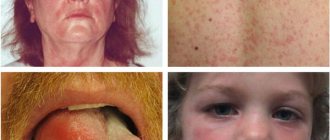A tingling sensation throughout the body is a sign of many vascular and neurological diseases. This is how endocrine pathologies can manifest themselves, for example, diabetes mellitus in an advanced stage, thyrotoxicosis, excess adrenal hormones, etc.
If you periodically experience tingling throughout your body like needles, we recommend that you consult a neurologist. With a high degree of probability, a malfunction in the autonomic nervous system will be detected. Then it will be necessary to identify the cause of such a disorder - what kind of disease led to damage to the structure of the nerve fiber. After making an accurate diagnosis, the doctor will be able to develop an effective and safe course of therapy.
It is very difficult to independently identify the cause of such a symptom, since the anatomy and physiology of the autonomic and central nervous systems are quite confusing and incomprehensible to a person without a medical education. Here are just some information that will help to better understand the mechanism of pathological manifestations:
- in the structures of the brain there are centers that analyze impulses coming from different parts of the body;
- The senses (touch, smell, vision, hearing, taste) are responsible for collecting information about the environment;
- the transmission of signals from the sense organs occurs through sensory types of axons; they enter the structure of the radicular nerve, which transmits the signal through the spinal cord and the surrounding cerebrospinal fluid to the cerebral centers;
- back through the spinal cord and radicular nerves, a response impulse passes through the motor (motor) network of nerve fibers, which commands the muscles to contract or unclench;
- in this way the work of the vascular bed, the entire muscular framework of the body, internal organs, the process of breathing and heartbeat is coordinated;
- even the secretion of gastric juice occurs in a similar way after the passage of a signal from the gastric mucosa about the arrival of a food bolus;
- with pathological changes in small sensory nerve endings located in the middle and deep layers of the skin, a person feels a tingling sensation (thus the autonomic nervous system signals about problems and pathological processes).
If you have tingling skin all over your body, you need to see a neurologist as soon as possible. Only a doctor, with the help of special examinations, can identify the exact cause of such a neurological symptom related to paresthesia.
Of course, cases of physiological tingling are possible. But, as a rule, it occurs in limited areas of the body. For example, if a person was in a forced uncomfortable position for a long time, in which his blood microcirculation processes were disrupted. Against the background of oxygen starvation, small nerve endings suffer from ischemia and give a tingling effect. Thus, the body signals about pathological changes that require immediate help. After changing the position of the body, all unpleasant sensations disappear within a few minutes, as soon as adequate nutrition of the nerve fiber is restored.
If tingling sensations are present simultaneously throughout the entire body, this may indicate that the pathology is developing in the structures of the brain or spinal cord. If the patient is not provided with timely medical care, brain damage or paralysis of the entire body may develop. There is also a high probability of death due to respiratory or cardiac arrest.
If you have tingling sensations in your body and you are in Moscow, you can make an appointment with a neurologist right now. In our manual therapy clinic, the initial appointment with a neurologist is completely free for all patients. During the consultation, the doctor conducts an examination and establishes a diagnosis, giving individual recommendations for further examination and treatment.
You can make an appointment for a free appointment with a neurologist using the special form located at the bottom of this page. You can also call the number provided and agree with the administrator on a convenient time for your visit.
What does tingling all over the body mean?
First, let's look at the question of what tingling throughout the body means and what this sensation indicates. So, tingling is a subjective sensation that is not manifested externally in any way. It may be accompanied by pale skin, goose bumps, or may remain without external manifestations. It all depends on the reason for the appearance of such a clinical sign.
As mentioned above, small sensory and motor nerve endings are present literally throughout the body. They penetrate all layers of skin, muscles, ligaments, tendons. Each nerve ending is connected to a small blood vessel (capillary). It provides uninterrupted nutrition to the nerve fiber.
If the blood supply is disrupted for one reason or another, a tingling sensation occurs, then aching. If emergency measures are not taken, the nerve fiber begins to die and the tingling sensation is replaced by numbness.
What does tingling throughout the body mean - this is a reaction of the autonomic nervous system in response to a violation of the blood supply or innervation. This condition can occur with various pathologies at the level of the brain and spinal cord, spinal column, nerve plexuses, radicular nerves, large, medium and small nerves responsible for the innervation of the body.
Tingling sensations throughout the body can occur against the background of poisoning, disruption of the endocrine system, and even with the development of acute viral or bacterial infections. We will analyze all possible reasons in more detail later in the article.
Diseases with tingling symptoms
Cardiovascular problems and characteristic symptoms may occur due to underlying diseases that impair blood circulation. To some extent, these diseases do not manifest their own symptoms.
However, if the body hurts in different places, these sensations wander, a long and repeated consultation with a doctor is necessary. Such diseases may include pathologies and injuries:
- chronic renal failure, in which itching occurs in half of the cases;
- Impaired liver function due to stagnation of bile, in some cases this is the only sign of the disease;
- cardiovascular, characterized by low blood flow to tissues and organs;
- thyroid gland due to increased kinin activity in combination with increased temperature;
- Diabetes, roughness and itching occur when blood vessels become clogged with sugar crystals, preventing the elimination of toxins;
- blood circulation in capillaries, metabolic disorders in the epithelium;
- cancer due to tumor growth, radiation due to chemotherapy, organ damage, or metabolic problems;
- circulatory disorders in the brain, in the pre-stroke stage;
- joints or spine.
To the list of these people you can add epilepsy, migraine, alcohol and drug addiction. Consultation with a doctor will be especially necessary if the above symptoms are combined with dizziness, nausea, darkening of the eyes, moisturizing of the skin and sweat.
Reasons why tingling throughout the body
Why is there tingling all over the body? This question can only be answered by conducting a full examination of the patient. Based on additional clinical signs, an experienced neurologist will be able to exclude the possibility of a vascular accident, disruption of the passage of nerve impulses along the spinal cord, etc.
The main causes of tingling throughout the body include the following diseases and conditions:
- iron deficiency or B12 deficiency anemia - with an insufficient number of red blood cells, the body's cells experience oxygen starvation, which manifests itself in the form of unpleasant sensations;
- deficiency of certain minerals, for example, magnesium, leads to defective transmission of nerve impulses through a network of small nerve endings;
- insufficient amount of B vitamins - the function of the nerve fiber is impaired, it undergoes partial atrophy;
- spinal cord stenosis occurs (for example, when a dorsal hernia prolapses into the lumen of the spinal canal or when the vertebral bodies are displaced against the background of intervertebral disc protrusion);
- the blood supply to cerebral structures is disrupted (for example, with the development of posterior vertebral artery syndrome against the background of long-term osteochondrosis of the cervical spine);
- foci of ischemia develop in the structures of the brain against the background of atherosclerosis and other vascular pathologies;
- there is an emergency increase in blood pressure;
- A large amount of adrenaline, norepinephrine, cortisol and other stress hormones are released into the blood;
- Diabetic angiopathy and neuropathy develop against the background of a constant increase in blood sugar levels in uncontrolled diabetes mellitus.
There are several other possible causes of tingling throughout the body, like needles, and among them it is worth highlighting tumors, infections of the spinal cord and brain. Sometimes potential causes of tingling skin throughout the body are traumatic lesions of the structures of the spinal column. The risk group includes older people with developing osteoporosis. In them, even minor injuries can lead to a compression fracture of the vertebral column. This injury often causes the development of various neurological manifestations, including paresthesia throughout the body.
Only an experienced neurologist can determine exactly what causes tingling throughout the body. He may prescribe an EEG, MRI of the cervical spine and head, ultrasound of the vessels of the neck and head, X-rays, etc. Based on the results of all examinations, the doctor will make a diagnosis and prescribe adequate treatment. It is not recommended to take measures to combat this symptom on your own. This can lead to tragic consequences.
Possible reasons
Often the above symptoms are caused by staying in one position for a long time. It interferes with normal blood circulation and can compress nerve endings. When changing position, the body itches, sometimes itches. In a normal state, a small warm-up will relieve all unpleasant sensations. It is more difficult to cope with discomfort when blood flow is impaired for other reasons. It can be:
- Prolonged and monotonous physical activity;
- skin diseases and fungal infections;
- allergic reactions to cosmetics and medications;
- parasitic infections, animal and insect bites;
- low or high temperatures; the person may sweat profusely;
- mental disorders;
- deficiency of vitamins or microelements;
- food or chemical poisoning;
- alcohol or tobacco poisoning.
A slight tingling sensation throughout the body is a symptom of the disease.
Symptoms such as tingling throughout the body are classified as neurological. They indicate a disturbance in the conduction of a nerve impulse or incorrect processing of received information by brain structures. If such clinical signs appear, an urgent consultation with a neurologist is necessary.
Minor tingling throughout the body may be present during intoxication. In this case, toxins and tissue breakdown products enter the nerve endings along with the arterial blood flow. They negatively affect the nerve endings and the person feels an unpleasant tingling sensation throughout the body; when it appears against the background of elevated body temperature, measures should be taken to detoxify the body.
Also, tingling can be a symptom of damage to brain structures due to circulatory problems. With the development of ischemic stroke at an early stage, a volatile tingling sensation may occur in one half of the body. If, along with them, even a slight decrease in muscle strength is felt, a dilated pupil appears in one eye, or a violation of the symmetry of the facial muscles occurs, you should immediately seek medical help. In case of a stroke at an early stage, it is possible to provide emergency conservative care, after which the patient will not develop paralysis.
Manifestations of tingling, burning, numbness sensations
Along with these sensations, as a rule, other symptoms associated with a disorder of higher nervous activity may appear, such as decreased mood, sleep disturbance, causeless anxiety, internal trembling, as well as the following:
Often accompanying symptoms of numbness, burning, tingling
- Heart pain, palpitations, chest pain, chest pain.
- Psychosomatic disorders.
- Muscle pain. Muscle pain (“twists”).
- Lower back pain, heaviness in the lower back or back.
- Headaches of various types and intensity.
- Heaviness in the body. Heaviness in the limbs.
- Feelings of heat or chills. Attacks or “hot flashes” of heat, chills.
- Feeling of a lump in the throat. Difficulty swallowing, choking.
- Nausea, stomach pain, gastrointestinal disorders.
- Feeling of weakness, emptiness, fatigue.
- Dizziness. Impotence.
Causes of feelings of numbness, burning, tingling
Feelings of numbness, burning, tingling in various parts of the body, which can be due to various reasons.
For example:
- if a person has been in the same position for a long time, any part of the body may become numb,
- the situation can occur after long periods of heavy, tiring physical activity,
- if there is a lack of any microelements,
- may be an indicator of various vascular diseases,
- numbness, burning, tingling in various parts of the body can be associated with serious diseases caused by organic lesions of the central nervous system (for example, polyneuropathy is a fairly common disease in severe forms of alcohol addiction); - the most common sensations of numbness, burning, tingling manifests itself in various borderline mental states and are included in such syndromes as: neuroses, anxiety disorders, depression, etc.
Treatment of nerve tingling throughout the body
Nervous tingling throughout the body is not an independent disease. This is a clinical symptom of various pathological changes in the human body. Therefore, treatment can begin only after an accurate diagnosis has been made. During the examination and examination, the doctor establishes the diagnosis and the reasons that led to the development of a particular disease. Then the patient is given individual recommendations. These may include:
- changing your diet to include all the necessary nutrients, minerals and vitamins;
- maintaining an active lifestyle with sufficient physical activity, since paresthesia can appear against the background of advanced cases of physical inactivity;
- proper organization of sleeping and working space;
- giving up bad habits, etc.
In our chiropractic clinic, severe tingling sensations throughout the body are treated only after a diagnosis has been made. If they are provoked by a dorsal intervertebral hernia, then measures are first taken to reduce the hernial protrusion of the nucleus pulposus and restore the integrity of the cartilaginous tissue of the intervertebral disc. Osteopathy and laser vaporization can be used for this. Then several sessions of manual traction of the spinal column are performed. The doctor may also prescribe massage, physiotherapy, therapeutic exercises, kinesiotherapy, reflexology, etc.
The course of treatment is always developed individually. Therefore, we recommend that you make an appointment for a free appointment with a neurologist at our manual therapy clinic. During the consultation, you will be given individual recommendations for examination and treatment.
Diagnostic methods
If the above measures do not help, the body still hurts, the symptoms recur, a diagnosis is necessary. So it will be for the exact cause of the ailments. Since the list of possible diseases is extensive, various types of diagnostic methods can be used to determine the source of the tingling sensation:
- Magnetic resonance imaging or computed tomography to examine the brain or spine;
- X-rays may also be ordered;
- The heart is monitored by an electrocardiogram;
- if vascularization is suspected, an ultrasound examination is prescribed;
- The nervous system is examined using electromyography;
Treatment of pins and needles and goosebumps in the hands at the MART clinic
Goosebumps in the hands, pins and needles, numbness and other similar sensations in the hands, as a rule, indicate the presence of serious disorders in the body. Some of them can even be dangerous, and therefore you should not try to solve the existing problem yourself or using traditional methods. Prescribing the necessary treatment for goosebumps, burning sensations, pins and needles and other discomforting sensations in the right or left hand is possible only after determining the exact cause of their occurrence.
To identify the cause of paresthesia in the hands, it is necessary to undergo a thorough examination, which is recommended to begin with a visit to a neurologist. Effective treatment can only be prescribed by a doctor based on examination and additional research methods: laboratory tests, ECG, MRI, ultrasound.
At the MART medical center, treatment courses for pins and needles in the fingers and goosebumps in the hands are selected individually. If osteochondrosis or other neurological pathologies are detected, manual therapy, therapeutic massage and regular exercise therapy are prescribed. Physiotherapeutic procedures and reflexology are also used to restore normal sensitivity in the hand.
Sign up at the MART medical center in St. Petersburg (see map) by phone, or leave a request on the website.










